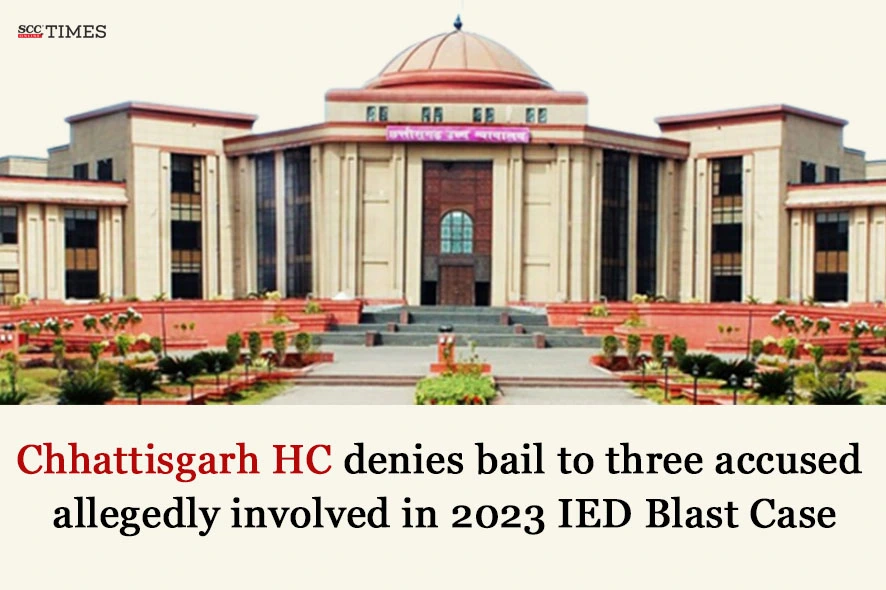Chhattisgarh High Court: In a criminal appeal filed against Trial Court’s order rejecting the bail application filed by an accused in the 2023 IED Blast Case, the Division Bench of Ramesh Sinha*, CJ., and Bibhu Datta Guru, J., dismissed the appeal, holding that the Trial Court’s decision reflected a correct appreciation of facts, materials on record, and the law applicable to such cases.
Background
According to the prosecution, on 17-11-2023, at about 3:40 PM, after the conclusion of vote casting, an Indo Tibetan Border Police Constable (‘the deceased’) was returning along with the security force. When they reached near Badegobra, there was an intentional bomb blast. As a result of the said bomb blast, the Constable sustained grievous injuries and subsequently died.
Based on the said incident and complaint, a criminal case was registered against the accused persons, including the present accused persons, under Sections 147, 148, 149, 302, 307, 120-B, 121, 121-A of the Penal Code, 1860, Sections 4, 5, and 6 of the Explosive Substances Act, 1908, Sections 25 and 27 of the Arms Act, 1959, and Sections 16, 17, 18, 20, 23, 38, 39, and 40 of the Unlawful Activities (Prevention) Act, 1967 (‘UAPA’).
The appellant filed a bail application under Section 483 of the Bhartiya Nagarik Suraksha Sanhita, 2023 (‘BNSS’) before the Trial Court, which was rejected by the impugned order due to no merit.
Analysis and Decision
At the outset, the Court stated that a bare perusal of Section 43D(5) of the UAPA revealed a specific statutory embargo on the grant of bail to an accused person charged under Chapters IV and VI, which relate to terrorist activities and terrorist organizations. The section mandates that unless the Court, upon perusal of the case diary or charge-sheet, is satisfied that there are no reasonable grounds to believe that the accusations are, prima facie, true, bail cannot be granted. Conversely, where there exist reasonable grounds to believe that the allegations are, prima facie, true, the bar under Section 43D(5) squarely applies, and the Court is prohibited from enlarging such accused on bail.
The Court stated that the legislative intent was clear, i.e., in cases involving terrorism-related offences, the threshold for bail was significantly higher than ordinary criminal cases. The safeguard to prevent misuse of this provision is built into the requirement that the Public Prosecutor must be given an opportunity to be heard. However, the Court stated that the Section does not create an absolute bar against bail in every circumstance.
Upon a careful consideration of the contentions, charge-sheet and material collected during investigation, as well as the nature and gravity of the offences alleged against the accused persons, the Court held that the prosecution had placed sufficient material on record to prima facie establish their involvement in the larger conspiracy to carry out terrorist activities, including the IED blast which resulted in the death of a security personnel. The Court added that their association with the proscribed terrorist organization CPI (Maoist), their alleged role in providing logistics, materials, and other support essential for the execution of the offence, and participation in conspiracy meetings, was substantiated through statements of protected witnesses, recoveries made pursuant to their disclosures, and other documentary evidence.
Given the statutory bar under Section 43-D(5) of the UAPA, the Court stated that it could not lightly disregard the materials placed on record which, at this stage, established a prima facie case against the accused persons. The Court added that the Supreme Court had consistently held that when there is reasonable ground to believe that the accusation against the accused is prima facie true under UAPA, the Court shall not grant bail.
“Mere prolonged detention or socio-economic hardship cannot outweigh the serious and grave nature of allegations involving offences against national security.”
Thus, the Court held that the impugned order reflected a correct appreciation of facts, materials on record, and the law applicable to such cases. The Court found no infirmity, perversity, or illegality in the said order warranting interference in appellate jurisdiction.
Accordingly, the appeal was dismissed. However, the Court hoped and trusted that the Trial Court would make an earnest endeavour to conclude the trial expeditiously, preferably within 6 months. The Court further directed the accused persons to co-operate with the trial.
[Bhupendra Netam v. Union of India, CRA No. 318 of 2025, decided on 21-07-2025]
*Order authored by: Chief Justice Ramesh Sinha
Advocates who appeared in this case:
For the appellants: Ravipal Maheshwari
For the respondent: B. Gopa Kumar








